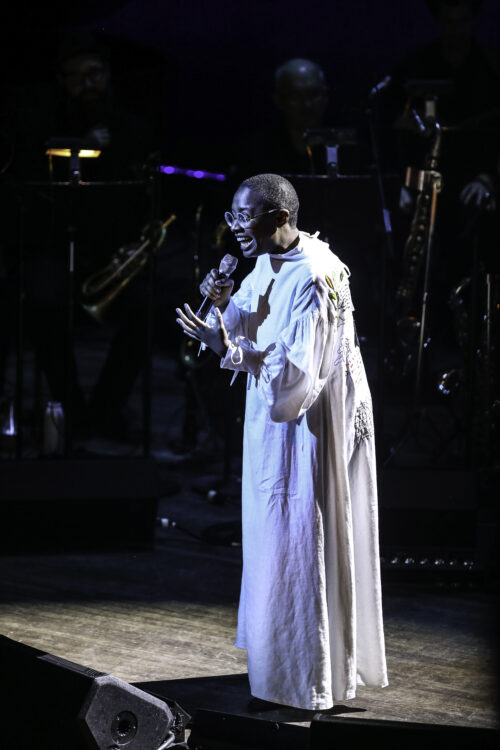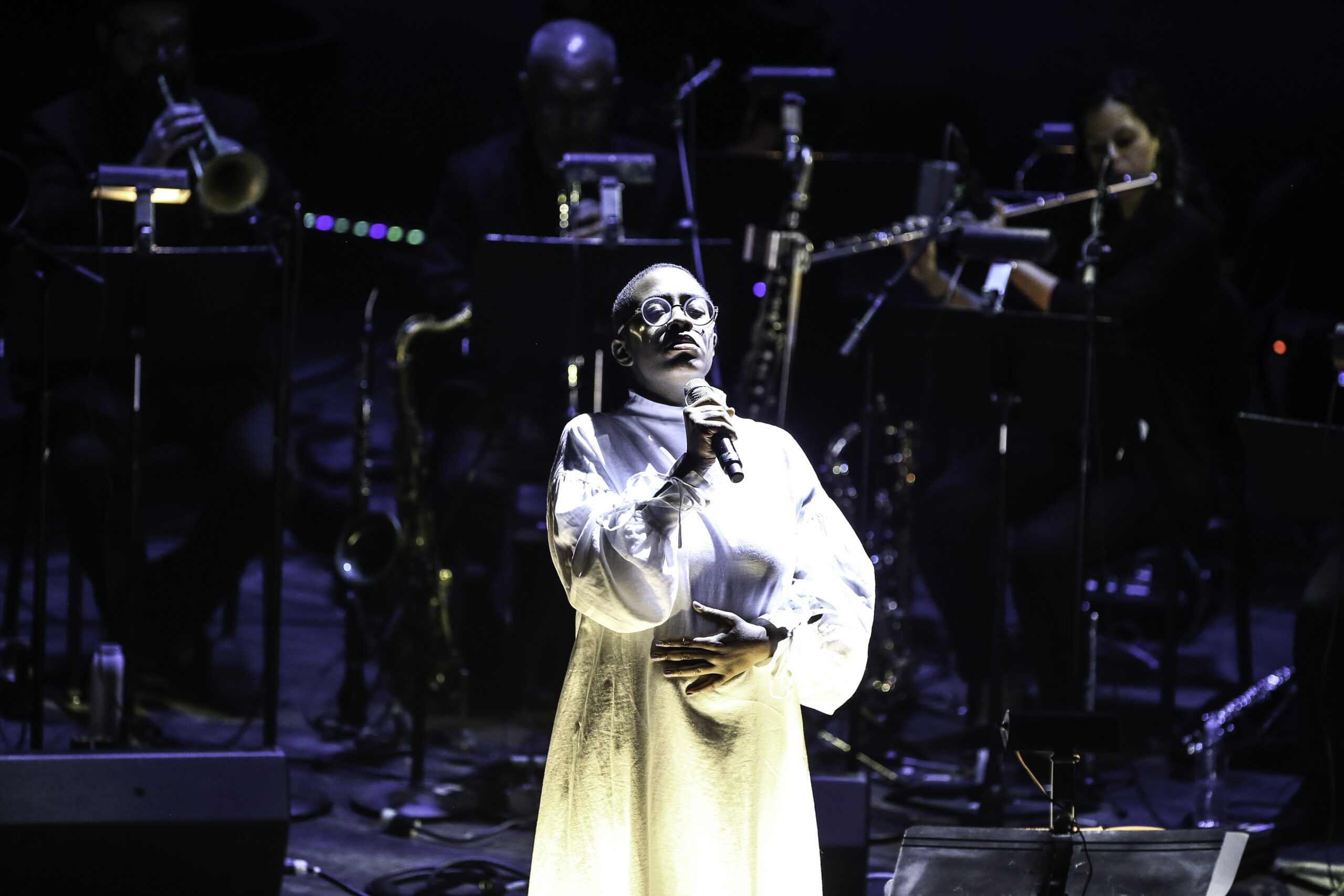Whether she’s putting her spin on a Burt Bacharach number or an old American folk standard — or performing one of her own keenly perceptive songs — Cécile McLorin Salvant draws out the human drama of the words she sings in exquisite detail, delivering with the narrative command you’d expect on a Broadway theater or an opera house stage. Salvant’s folk opera-esque song cycle, The Ogresse, which returns to the Kennedy Center’s Terrace Theater on Saturday, almost a full four years after its area debut there in 2018, represents the height of her fully immersive style.
CapitalBop was there in November 2018, when the show was still relatively new. How will it change with four years of age, experience, musical wisdom and convulsions throughout the volatile world outside? That is hard to say, but read on for a taste of what the experience was like the first time around.
Ogresse was co-commissioned by the Kennedy Center, the New Jersey Performing Arts Center and the Metropolitan Museum of Art, and had been performed in the latter two venues already by the time it arrived in D.C. It sounds more like a Hadestown-esque folk opera or operetta than it does even the most tightly knit conceptual album. This is not a playlist, or any other modern-style collection. This fact largely stems from the presentation, a kind of combination of recitatives and arias, where the more character-driven songs are punctuated by spoken interludes. It’s like Stephen Schwartz and Stephen Sondheim by way of Billy Strayhorn, considering the dagger sharpness of Salvant’s lyrics and Darcy James Argue’s sublime, playful yet sophisticated arrangement. Themes, melodic fragments and swinging solos weave in and out, echo and elaborate, develop and blossom into a score that is as alive as the characters Salvant writes.

Like some of Schwartz and Sondheim’s most iconic work, Ogresse takes up the tropes and conventions of traditional, European fairy (or American folk) tales. But here all traces of these folk traditions’ pasteurized modern mutations — the innocent, bedtime story sort of thing — are ground out like wheat separated from the chaff. Salvant’s ogresse, a human(oid) with “skin of chocolate brown,” capped by a crown of human bones, flees from an oppressive situation at home to a forest where she takes up residence. The local townspeople repeatedly gather their torches and pitchforks until a lone, physically feeble but emotionally strategic man determines to slay the ogresse by making her fall in love. Things do not work out well for either of them.
In this more fantastical format, Salvant’s story of a dark-skinned, maligned, probably misunderstood “monster” takes on a metaphoric life of its own, opening up myriad opportunities for the audience to reflect on broader issues like Western beauty standards, race, childhood trauma and its effects on adults, fear and willful ignorance. This feeling of American folk mythos is further heightened by many of the arrangements, especially in the recitative moments. The simple, driving congregation of strings, banjo, kick drum and vocal gives the whole work feeling like you could hear it on any Appalachian front porch or around a campfire, not unlike the myths and murder ballads that populated Harry Smith’s Anthology of American Folk Music and Bob Dylan’s Basement Tapes.
Central to that presentation is, of course, Salvant’s limber, mellifluous voice, capable of eliciting laughs and then gasps at the drop of a pin. She sings flirtatiously when the ogresse proclaims her freedom, “I’m breezy / I do what I want, whenever I want / I can be lazy, I can act crazy.” Then she shows crushing vulnerability as she rebukes her suitor’s honeyed words: “I do not believe you…why should I believe you?” And there’s a rage that burns ice cold as she declares, “My rage is a forest fire,” after she discovers her suitor’s betrayal. Salvant’s final words as “the ogresse” are punctuated by a plunging vocal run that collapses and condenses all agony of Mozart’s Requiem into mere seconds.
At a point late in the story, the ogresse’s suitor, having finally won her heart through acts of simple kindness and reverence, sings: “What if the world with its turning / it turns us against each other?” The ogresse unfortunately has seen the world turn on her, and turn her. But the story of Ogresse is meant to capture that image and hold it up to us, as a mirror. In this mirror, Salvant wants us to see where it is possible to turn against the gravitational pulls of fear, ignorance, deceit and distrust, and turn the world another way.
Cécile McLorin Salvant will perform Ogresse at the Eisenhower Theater at 7:30 p.m. on Saturday, Nov. 12. Tickets are available at the Kennedy Center’s website.








Join the Conversation →